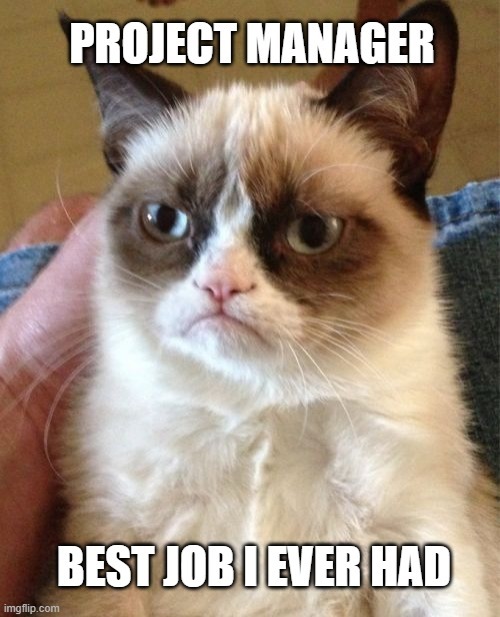25 May 2020
How to become an IT Project Manager according to… IT Project Manager

Software development companies need not only developers but also people who take care of technical staff, deadlines and clients. Their spirit animal is a calendar, their motto – “Update?” and their true purpose – a punching bag. You might know them as Technical Project Managers. They are the glue that holds everything and everybody together. With this great power, comes an even greater set of project management responsibilities. So, how to become an IT project manager? If you’d like to be one of those annoying, yet probably the most responsible people in the company, read on.
TL;DR: How to become a Project Manager? I have to answer that question like a real Project Manager – it depends. 😉
Seriously, there’s no simple answer or even a unified IT Project Manager job description. It really depends on your background, experience, interests, soft skills, and personal predispositions. On the other hand, there’s your company and/or the client’s side and their requirements. That is why every project management case should be discussed separately.
Having said that, I can definitely point out some areas you HAVE TO be familiar with to achieve the IT Project Manager position according to my project management experience. Before we start with learning how to become a Project Manager in an IT company, let’s focus on the responsibilities included in the Project Manager job.
We've got many talents on board, and nor everybody started in IT
What does a project manager do?
Disclaimer: I need to mention that all Project Manager duties are somehow connected to each other. I will try to explain them one by one but the fact is that they do intertwine – that’s IT project management for you.
Coordinating the project
One of the main Project Manager’s responsibilities is to make the software project successful. You can be responsible for different areas: creating the project plan and the roadmap with milestones (based on the project plan), managing the budget (based on the project plan, roadmap, and milestones), removing various obstacles (because the project plan, the road map, milestones, and the budget should be delivered on time).
Unfortunately – it’s the entry-level MVP (minimum viable product, a.k.a. bare minimum) version only. Based on your company’s policy and client’s requirements you can be responsible for managing the whole project based on a selected methodology (Waterfall, Scrum, Lean, XP, Scrum Nexus – you name it). You may be asked to coach your client on this methodology as well.
Removing obstacles and risk management are also big thing: sometimes you will speak to an external supplier because they missed their deadline. Or maybe there is a personal problem in your team that needs to be resolved ASAP. Or…
Of course, it’s not the end. Managing and preparing official documents, creating Work Orders, and delivering invoices on time. Remember, that I mentioned just one project. Multiply it by two to five because there’s a 99% chance you will have more than one ongoing project at the same time. I hope that you start to see the big picture. Spoiler alert: it’s only the beginning.
Managing variable resources
Ok, so you have your project(s). Do you remember when I told you about removing obstacles? As the Project Manager, you’re also responsible for your team, not only the project itself. You have to know your colleagues, and their strong and weak points both in technical and soft skill areas.
Why? Sometimes you need to compose a team for the new project. Sometimes you need to find someone who helps your team. Your boss wants to know how many people are without a project because they’re thinking about a new contract.
When someone has a problem – you’re the first point of contact. Your friend PM needs to borrow one of your team members because they know a specific technology very well? Sure, no problem! But wait a minute… WE NEED THAT GUY NOW. I can’t do it. We need to figure out a different solution. But where we can find it? This is what managing variable resources look like in practice.

Evaluating people
Now it starts to be a little complicated. Everybody would like to earn more money. Duh. If they want to improve themselves at the same time – that’s great. The company has its financial limitations so it needs to split available resources between all employees. How can your CEO evaluate that?
They will probably ask their PMs because they know the employees best. You’re working with them each day. You know their skills, strengths, and weaknesses. You know what other teammates say about them. You know in which areas they need to improve. So there’s a big chance that you will be responsible for people evaluation.
Sometimes it’s not evaluation – it’s a judgment day. Especially if somebody is far worse than the rest of the team. It’s extremely hard to say but sometimes you need to be honest and straightforward. It’s not shameful or cruel – it’s a part of your work.
Delivering on time & managing priorities
Nobody wants to work with an untrustworthy person. You, as the IT Project Manager, can’t be that type of person. If you say “I’ll do it on time” you better do that. Many things depend on it, especially the project’s success. It can be connected to different things: delivering the functionality on time, preparing documents, organizing a meeting, finding a person with a particular set of skills…
However, it doesn’t mean that you should agree to everything people throw at you. You can say “no” as often as “yes, but I need more time”.
That’s why this point has two parts. Now we are talking about managing priorities. As PM you will have a lot of tasks on you, trust me. Some people demand that every single task they give you should be ready by yesterday. Yeah, right.
You need to be able to carefully rate your tasks and arrange them in your priority list – from the most urgent, to those that can wait a little bit.
More useful content from our Project Managers:
What makes a good project manager?
I covered the main areas that in my opinion are the key factors for becoming a project manager. I know that right now they might seem scary and impossible to handle at the same time. Luckily, with a particular set of soft skills, management skills, and a little bit of practice, it won’t be a problem for even a newbie Technical Project Manager!
Some of those skills are essential for a project management career path and some are only nice supplements. Don’t judge a book by its cover and trust me, they are very useful in day-to-day work, even if they don’t look like it. I will split them into three groups based on the MoSCoW method. So how to become an IT project manager?
IT Project Manager skills – A MUST:
- Learn how to effectively manage your time, not only the team’s time
From my work experience in IT project management, I can honestly tell you that your list of tasks will be never-ending, only getting longer and longer. In order to become a project manager, you have to deal with that somehow. Project success, customer satisfaction, and project team morale depend on it.
But worry not! There are several useful techniques and tools (both analog and digital) for IT project managers that can be useful: GTD methodology, Bullet Journal, and even simple sticky notes. It doesn’t matter which one you choose, as long as it fits and works for you. At the same time, you should remember two additional things: priorities and effective work.
In my experience, it’s hard to manage projects without a proper tried-and-tested method. As far as priorities go, useful references for start are Eisenhower Matrix or the aforementioned MoSCoW method. For effective work, try the Pomodoro method. They’ve been certified by many professionals, including the Project Management Institute, so don’t be afraid to use them to show off your management skills.
- Think logically, combine the facts, draw conclusions
As the IT Project Manager, you will get a lot of different data from different sources (clients, teams, companies, external suppliers, etc.). In project management, those pieces of information usually are highly connected. You should be able to see or create those connections: what depends on what, what should/shouldn’t wait, and who needs something from someone else at the moment.
Have you always wanted to be a superhero? That’s great! Drawing conclusions is a key benefit and you can save the project if you can connect the proper dots. You’ll probably be responsible for risk management but you can develop the necessary skills by playing strategic games, working with logic puzzles, reading crime stories and trying to figure out who the killer is, and using mind maps to visualize complex issues. In general: you need to think outside the box or forget about the box altogether!
- Be gentle and polite
A Project Manager has to be a professional so leadership skills are crucial. You are a frontman/frontwoman of the project, the team, and the company. There’s no space for being rude, even if you have personal problems with somebody or you simply can’t stand the person. You will meet different types of people: C-level (CEO, CTO, COO, etc), stakeholders, technical staff, and various team members. You must know their needs and goals and speak their language.
At the same time, you need to manage the project team, and their requests, negotiate with them and suggest whether to do or not to do something. How to develop those IT project management skills? I recommended external courses/workshops in a small group, e.g. “How to manage internal and external stakeholders in the project” or similar. Ask your CEO, maybe they can organize workshops for all managers in the company?

IT Project Manager skills – SHOULD:
- Acquire some skills in business analysis
If you have a Business Analyst on the team, don’t hesitate to consult them. As a Project Manager for IT, you can be responsible for gathering requirements and managing them. Sometimes you may be even asked to lead a workshop with clients (ex. during the pre-sales phase).
So what information from the business analysis field is worth implementing in project management? IT Project Managers are expected to know what techniques to use on different parts of the workshop (Business Model Canvas/Lean Canvas, Priority Matrix, User Story Mapping, SMART rule), how to tackle your list of tasks in the project, what is User Story, Definition of Done, Definition of Ready.
- Know your ene… methodology
As I’ve mentioned before, IT Project Managers work with some popular methodologies. May it be Scrum, Lean, Nexus, Waterfall, or anything else. Because your whole project depends on it, it’s good to know how to effectively use them.
Even if you are not leading the project – I mean: you are not responsible for conducting the project following the methodology – it’s still beneficial to know how different methodologies work. It can be useful when you plan something (roadmap, release, feature, etc) and don’t want to destroy the whole project concept.
Unfortunately, sometimes you will be responsible for leading the project in the pre-selected methodology. In that case, knowing that methodology is a must, not a should. So I advise you are ready beforehand, instead of panicking last minute.
IT Project Manager skills – NICE TO HAVE:
- Be familiar with your technology stack
A Project Manager doesn’t need to be a strictly technical person. You will have your lead developer or an architect as a wingman. BUT (there’s always a “but”) if you know the technology used in the project, you can do some things much quicker. You can answer customers’ questions without engaging your teammates (and at the same time, they can focus on development work). With a bit of technical knowledge, you will be able to advise stakeholders. Sometimes you might be able to spot when the developer tries to trick you. 😉 It doesn’t take 5 hours to do that, Larry!
Clients always prefer to speak with someone that has the technical knowledge and is able to explain difficult stuff to them. Ask project managers anywhere, and they will tell you to get some tech lessons. They will definitely help you to get along with customers, look professional and gain their respect. Project management level up!
- Learn about the high-level architecture
This point is directly connected with the previous one, just like technology and architecture are always intertwined. They are not the same thing, though. When I say “high-level architecture” I mean the differences between public cloud and own servers, what’s the load balancer and why you should have it, what’s VPN, DMZ, or why you should consider CDN when you have a lot of images in your database. Don’t be concerned, it all just sounds scary. I’m sure you’ll get a decent amount of preparation from architecture developers before venturing forth.
This knowledge will surely gain you kudos from clients, external suppliers, and the team too. Having more kudos as the Project Manager is always a beneficial thing – not only for you but for the project as a whole too. It’s a big part of being professional and gaining the trust of your clients.
Nowadays, UI and UX are a massive part of the software development business. A lot of people don’t see the difference between them – but not you!
There’s a high chance that at some point you’re going to cooperate with product designers. In order to get your ideas and thoughts across in conversations, you need some basic knowledge about what they do. Examples? Imagine there’s been a 40-minutes long discussion about planning graphic designs with customers and nobody seems to reach any conclusions – and there’s you, diplomatically suggesting A/B testing. Next stop: Nobel Peace Prize.
For that part, I recommend free courses on Udemy.
Summary: How to become an IT project manager?
To be perfectly honest with you – it’s not even 25% of project management responsibilities and skills. All project managers, even the best ones, have started somewhere, though! I think I provided a pretty good reference point on how to become an IT project manager. Maybe after this read, you’ll realize that project management is your dream career path but you need to work on some areas and gain more experience. That’s a great first step! What’s next? “It depends”… this time on you!
Good luck!

